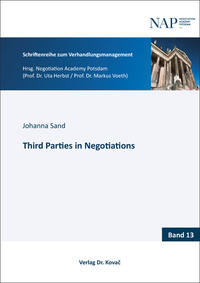
Since negotiators do not always manage to achieve mutually accepted agreements, they seek for better techniques to manage their oftentimes high-impact conflicts. Third-party intervention has been in the focus of alternative dispute resolution especially due to its advantages. However, giving up decision-making power to transfer it to people who are not primarily involved is a delicate business for negotiators. Since relinquishing power always comes with a loss of decision-making authority, negotiators expect to gain better outcomes in return. Whether the assumption is justified and if third parties can successfully be used as a strategic instrument in negotiations is the subject of the present work.